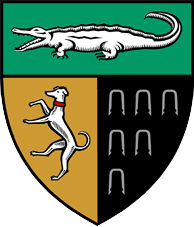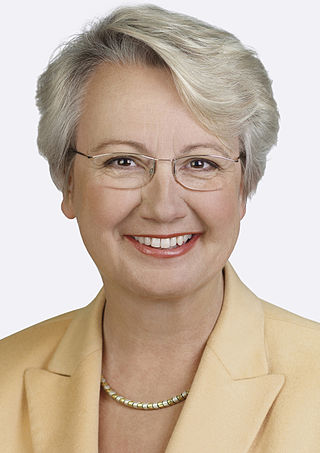
The Cusanuswerk is one of the thirteen German sponsorship organizations financed by the Federal Ministry of Education and Research (Germany) to promote gifted students. It is headquartered in Bonn.

The Cusanuswerk is one of the thirteen German sponsorship organizations financed by the Federal Ministry of Education and Research (Germany) to promote gifted students. It is headquartered in Bonn.
The Cusanuswerk was founded in 1956 under the authority of the German Bishops' Conference. It is named after the medieval scholar Nicholas of Cusa. The aim of the Cusanuswerk is to promote gifted Catholic students until their university graduation. [1] The Cusanuswerk also supports exceptionally talented Catholic doctoral students of all disciplines. [2]
From 1988 to 1995, the Cusanuswerk was directed by Annette Schavan; from 2004 to 2011 it was led by Josef Wohlmuth. [3] On October 1, 2011, he was succeeded by Georg Braungart. [4] Auxiliary bishop Christoph Hegge, Münster, is the commissary of the German Bishops' Conference for the Cusanuswerk since 2013.
The Cusanuswerk awards public funds to "particularly gifted Catholic students of all disciplines." [5]
For admission, candidates have to apply at the organization or suggested for application by university lecturers or high school teachers.
The selection is a multi-step procedure. At its end, around one quarter of all applicants will be admitted. Admission depends on three main criteria including academic performance, social engagement and Catholic denomination. Admission is possible starting at the entrance to university but also at later stages as long as five semesters of standard study period remain. [6]
An annual exhibition is organized for applicants studying arts, displaying works of all nominated applicants.
Financial support is subject to the rules by the Federal Ministry of Education. [7] It consists of either a fixed monthly lump-sum or a more generous means-tested scholarship for students in need, similar to the regulations of the BAföG. Doctoral students receive a scholarship independent of their financial background. [8] Additional support is available for study and research stays abroad.
The academic support includes regular educational events as well as a spiritual enrichment program. It is expected that support recipients attend an annual summer school organized by the Cusanuswerk. [9]
During their studies, Cusanuswerk scholarship holders form groups at the location of their college. An appointed liaison professor provides additional support. All local scholarship groups elect representatives. Representatives of all local groups meet semiannually for a joint assembly (Cusanuskonferenz).
Social engagement and the acquisition of international experience are particularly encouraged for scholarship holders.
The Cusanuswerk also offers special career support for women based on mentorships and additional seminars.

The University of Georgia School of Law is the law school of the University of Georgia, a public research university in Athens, Georgia. It was founded in 1859, making it among the oldest American university law schools in continuous operation. Georgia Law accepted 14.77% of applicants for the class entering in 2023.

Yale Law School (YLS) is the law school of Yale University, a private research university in New Haven, Connecticut. It was established in 1824. The 2020–21 acceptance rate was 4%, the lowest of any law school in the United States. Its yield rate of 87% is also consistently the highest of any law school in the United States.
Same-sex marriage has been legal in Germany since 1 October 2017. A bill for the legalisation of same-sex marriage passed the Bundestag on 30 June 2017 and the Bundesrat on 7 July. It was signed into law on 20 July by President Frank-Walter Steinmeier and published in the Federal Law Gazette on 28 July 2017. Previously, the governing CDU/CSU had refused to legislate on the issue of same-sex marriage. In June 2017, Chancellor Angela Merkel unexpectedly said she hoped the matter would be put to a conscience vote. Consequently, other party leaders organised for a vote to be held in the last week of June during the final legislative session before summer recess. The Bundestag passed the legislation on 30 June by 393 votes to 226, and it went into force on 1 October. Germany was the first country in Central Europe, the fourteenth in Europe, and the 22nd in the world to allow same-sex couples to marry nationwide.

Proposition 209 is a California ballot proposition which, upon approval in November 1996, amended the state constitution to prohibit state governmental institutions from considering race, sex, or ethnicity, specifically in the areas of public employment, public contracting, and public education. Modeled on the Civil Rights Act of 1964, the California Civil Rights Initiative was authored by two California academics, Glynn Custred and Tom Wood. It was the first electoral test of affirmative action policies in North America. It passed with 55% in favor to 45% opposed, thereby banning affirmative action in the state's public sector.

The University of Brasília is a federal public university in Brasília, the capital of Brazil. It was founded in 1960 and has since consistently been named among the top five Brazilian universities and the top fifteen universities in South America by Times Higher Education (THE).

Annette Schavan is a German politician of the Christian Democratic Union (CDU). She was the Federal Minister of Education and Research in the government of Chancellor Angela Merkel from 2005 to 2013, when she resigned following the revocation of her doctorate due to plagiarism. From 2014 until 2018 she served as the German Ambassador to the Holy See. From April 2018, she also briefly served as first German Ambassador to the Sovereign Military Order of Malta.

The German Academic Scholarship Foundation is Germany's largest and most prestigious scholarship foundation. According to its statutes, it supports "the university education of young people who, on account of their exceptional academic or artistic talents and their personalities, can be expected to make an outstanding contribution to society as a whole". The Studienstiftung is non-political, non-denominational and ideologically independent. Its headquarters are located in Bonn; it also has an office in Berlin. The current president is University of Bonn director Michael Hoch, and its patron (Schirmherr) is the President of Germany, Frank-Walter Steinmeier.
The University of Richmond School of Law is the law school of the University of Richmond, a private liberal arts college in Richmond, Virginia. Richmond Law is ranked 66th (tie) in the US by US News, among the top five value law schools by the National Jurist, and one of the Princeton Review's 167 Best Law Schools of 2018.
The Faculty of Law and Justice of the University of New South Wales is a law school situated in Sydney, Australia. It is widely regarded as one of Australia's top law schools. The 2021 QS World University Rankings rank the UNSW Law Faculty 13th in the world, first for undergraduate law in Australia, 2nd overall in Australia and 3rd in the Asia-Pacific region, and the 2021 Times Higher Education subject rankings also rank it second in Australia, making it the top ranked law school in New South Wales according to both tables, as well as being the top undergraduate Law school in the country.

Ekin Deligöz is a Turkish-German politician of Alliance '90/The Greens who has been serving as Parliamentary State Secretary in the Federal Ministry of Family Affairs, Senior Citizens, Women and Youth in the coalition government of Chancellor Olaf Scholz since 2021. She has been serving as a member of the Bundestag since 1998.

Heinz Friedrich Ruppert Riesenhuber is a German politician (CDU) who served as Minister of Scientific Research under Chancellor Helmut Kohl from 1982 to 1993.

The ANU College of Law is the law school at the Australian National University and one of the seven academic Colleges of the ANU. It is located in Canberra, the capital of Australia. This provides the College with opportunities to connect with the work of the Parliament of Australia, the High Court of Australia, the departments and agencies of the Federal Government, as well as the local ACT law-making institutions – the Legislative Assembly and the ACT courts.

Ernst Benda was a German legal scholar, politician, and judge. He was the fourth president of the Federal Constitutional Court of Germany from 1971 to 1983. He also held the position of Minister of the Interior of Germany from 1968 to 1969.

Duke University School of Law is the law school of Duke University, a private research university in Durham, North Carolina. One of Duke's 10 schools and colleges, the School of Law is a constituent academic unit that began in 1868 as the Trinity College School of Law. In 1924, following the renaming of Trinity College to Duke University, the school was renamed Duke University School of Law.

The Federal Constitutional Court is the supreme constitutional court for the Federal Republic of Germany, established by the constitution or Basic Law of Germany. Since its inception with the beginning of the post-World War II republic, the court has been located in the city of Karlsruhe, which is also the seat of the Federal Court of Justice.

The German University in Cairo is a private non-profit university in New Cairo, Egypt. GUC was founded in 2002 by the presidential decree 27/2002 and according to the Egyptian law number 101/1992. The University of Stuttgart, the University of Ulm, the University of Tübingen, the University of Mannheim, the Academy of Fine Arts Leipzig, the German Academic Exchange Service (DAAD), the State of Baden-Württemberg, Germany, and the Federal Ministry of Education and Research, Germany, are among the main academic supporters of the GUC.
Students for Fair Admissions v. Harvard, 600 U.S. 181 (2023), is a landmark decision of the Supreme Court of the United States in which the court held that race-based affirmative action programs in college admissions processes violate the Equal Protection Clause of the Fourteenth Amendment. With its companion case, Students for Fair Admissions v. University of North Carolina, the Supreme Court effectively overruled Grutter v. Bollinger (2003) and Regents of the University of California v. Bakke (1978), which validated some affirmative action in college admissions provided that race had a limited role in decisions.

Katarina Barley is a German politician and lawyer who has been a Member of the European Parliament since 2019, serving as one of its Vice-Presidents. She served as Federal Minister of Justice and Consumer Protection in the fourth Cabinet of Angela Merkel. Prior to that, she had served as Federal Minister of Family Affairs, Senior Citizens, Women and Youth and, from 28 September 2017, as the acting Federal Minister of Labour and Social Affairs, both until 14 March 2018.
The Ernst Ludwig Ehrlich Scholarship Fund is one of thirteen Federally-funded Scholarship Foundations in the Federal Republic of Germany. It is located in Berlin.

Stephan Harbarth is the President of the Federal Constitutional Court of Germany (Bundesverfassungsgericht), former German lawyer and politician of the Christian Democratic Union (CDU). From 2009 until 2018 he served as member of the Bundestag. On 22 November 2018 he was elected to the Federal Constitutional Court by the Bundestag. He succeeded Ferdinand Kirchhof and serves in the court's first senate. On 23 November 2018, one day after his election to the court, he was elected Vice President of the Federal Constitutional Court by the Bundesrat. In this capacity, he is chairman of the first senate.